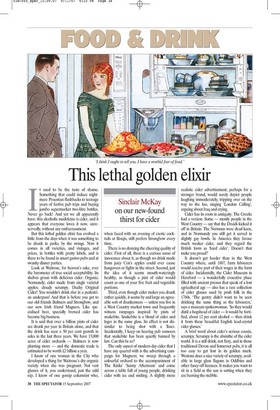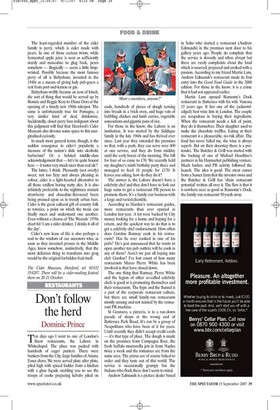This lethal golden elixir
Sinclair McKay on our new-found thirst for cider 1 t used to be the taste of shame. Something that could induce nightmare Proustian flashbacks to teenage years of furtive pub trips and buying jumbo supermarket two-litre bottles. Never go back! And yet we all apparently have: this alcoholic madeleine is cider, and it appears that everyone loves it now, unreservedly, without any embarrassment.
But this lethal golden elixir has evolved a little from the days when it was something to be drunk in parks, by the swings. Now it comes in all varieties, and vintages, and prices, in bottles with pretty labels, and is there to be found in smart gastro-pubs and at swanky dinner parties.
Look at Waitrose, for heaven's sake, ever the barometer of true social acceptability. Its shelves groan with delicious cider. Organic; Normandy; cider made from single varietal apples; cloudy scrumpy. Duchy Original Cider! You wouldn't drink that in a pedestrian underpass! And that is before you get to our old friends Bulmers and Strongbow, and our new Irish friend Magners. Like specialised beer, specially brewed cider has become big business.
It is said that over a billion pints of cider are drunk per year in Britain alone, and that the drink has seen a 50 per cent growth in sales in the last three years. We have 15,000 acres of cider orchards — Bulmers is now planting more — and the domestic trade is estimated to be worth £2 billion a year.
I know of one woman in the City who developed a thing for Waitrose's dry organic variety when she was pregnant. Not vast glasses of it, you understand, just the odd nip. I know of one gossip columnist who, when faced with an evening of exotic cocktails at Boujis, still prefers Strongbow every time.
There is no denying the cheering quality of cider. First of all, there is a curious sense of innocence about it, as though no drink made from juicy Cox's apples could ever cause hangovers or fights in the street. Second, just the idea of it seems mouth-wateringly healthy, as though a pint of cider would count as one of your five fruit and vegetable portions.
Third, even though cider makes you drunk rather quickly, it seems by and large an agreeable sort of drunkenness — unless you live in a West Country market town and frequently witness rampages inspired by pints of snakebite. Snakebite is a blend of cider and lager in the same glass. Its effect is not dissimilar to being shot with a Taser. Incidentally, I keep on hearing pub rumours that snakebite has been quietly banned by law. Can this be so?
The only aspect of modern-day cider that I have any quarrel with is the advertising campaign for Magners; we sweep through a colourful orchard to the accompaniment of The Kinks' Sunny Afternoon' and come across a table full of young people, drinking cider with ice and smiling. A slightly more realistic cider advertisement, perhaps for a stronger brand, would surely depict people laughing immoderately, tripping over on the way to the loo, singing 'London Calling', arguing about Iraq and crying.
Cider has its roots in antiquity. The Greeks had a version. Some — mostly people in the West Country — say that the Druids kicked it off in Britain. The Normans were dead keen, and in Normandy you still get it served in slightly gay bowls. In America they favour much weaker cider, and they regard the British form as 'hard cider'. Doesn't that make you proud?
It doesn't get harder than in the West Country where, until 1887, farm labourers would receive part of their wages in the form of cider. Incidentally, the Cider Museum in Hereford — a wonderfully evocative place filled with ancient presses that speak of a lost agricultural age — also has a rare collection of cider glasses used by posh folk in the 1760s. 'The gentry didn't want to be seen drinking the same thing as the labourers,' says a museum spokeswoman. 'So they would distil a hogshead of cider — it would be fortified, about 12 per cent alcohol — then drink it from these beautiful English lead-crystal cider glasses.'
A brief word about cider's serious cousin, scrumpy. Scrumpy is the absinthe of the cider world. It is a still drink, not fizzy, and in those traditional Devon and Somerset pubs, it is all too easy to get lost in its golden murk. Westons does a nice variety of scrumpy, available in large glass flagons in Oddbins and other fancy off-licences. It makes you want to sit in a field as the sun is setting when they are burning the stubble.
The least-regarded member of the cider family is perry, which is cider made with pears. In one of those curious twists, while fermented apple juice is seen as sufficiently sturdy and masculine to glug back, pears somehow — illogically — seem a little limpwristed. Possibly because the most famous perry of all is Babycham, invented in the 1940s as a means of giving lady pub-goers a rest from port-and-lemon or gin.
Babycham swiftly became an icon of kitsch, the sort of thing that would be served up by Ronnie and Reggie Kray to Diana Dors at the opening of a tinsely new 1960s nitespot. The same is unfortunately true for Pomagne, a very similar kind of deal, drinkswise. Incidentally, closet perry fans indignant about this judgment will find that Hereford's Cider Museum also devotes some space to this marginalised curiosity.
In much more general terms, though, is the sudden resurgence in cider's popularity a measure of the nation's slide into alcoholic barbarism? Or a belated middle-class acknowledgement that — let's be quite honest here — it tastes very much nicer than real ale?
The latter, I think. Pleasantly (not overly) sweet, not too fizzy and always pleasing in colour, cider is a light-hearted alternative to all those endless boring nutty ales. It is also infinitely preferable to the nightmare mutant strawberryand chocolate-flavoured beers being pressed upon us in trendy urban bars. Cider is the great cultural gift of country folk to townies, a point on which the twain can finally meet and understand one another. Even without a chorus of The Wurzels' 1970s chart hit 'I am a zider drinker, I drinks it all of the day'.
Cider's new lease of life is also perhaps a nod to the wisdom of our ancestors who, as soon as they invented presses in the Middle Ages, knew somehow, instinctively, that the most delicious thing to transform into grog would be the original forbidden fruit itself.
The Cider Museum, Hereford, tel. 01432 354207. There will be a cider-making festival there on 20-21 October


























































 Previous page
Previous page